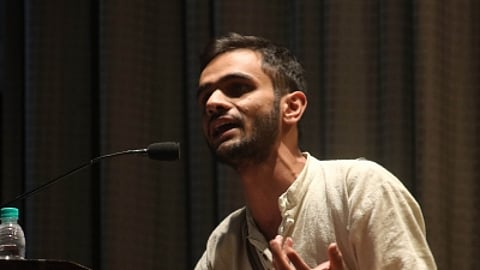

Follow TNM’s WhatsApp channel for news updates and story links.
The Supreme Court, on Friday, September 19, adjourned the bail plea hearing of student activists Umar Khalid, Sharjeel Imam, Meeran Haider, Gulfisha Fathima and Shifa Ur Rehman, arrested under the Unlawful Activities Prevention Act (UAPA) in the 2020 Delhi riots case.
A bench of Justices Aravind Kumar and NV Anjaria adjourned the hearing to September 22.
The hearing, which was initially scheduled for September 12, was deferred to September 19 after Justice Kumar informed the court that he had received the case files at 2.30 am, leaving insufficient time for review. The petitioners are being represented by senior advocates Kapil Sibal, Abhishek Manu Singhvi, and CU Singh.
The bail applicants are facing charges under the Unlawful Activities (Prevention) Act (UAPA) in a case linked to the alleged larger conspiracy behind the communal violence that rocked north-east Delhi in February 2020.
The Delhi High Court had earlier, on September 2, denied bail to Umar, Sharjeel and seven other accused, including Meeran Haider, Gulfisha Fatima, Athar Khan, Shifa-ur-Rehman, Mohd Saleem Khan, Shadab Ahmed, and Khalid Saifi. Another accused, Tasleem Ahmed, was denied bail by a separate bench.
All of them were arrested during widespread protests against the Citizenship Amendment Act (CAA).
Delhi Police have strongly opposed the bail applications, claiming that the riots were not spontaneous but a result of a “premeditated and coordinated conspiracy.” The police also accused the four of “playing active roles in orchestrating the violence with a sinister motive."
The 2020 violence had erupted amid nationwide protests against the Citizenship Amendment Act (CAA) and the National Register of Citizens (NRC). The unrest resulted in the deaths of 53 people and left over 700 injured.
The controversial CAA, which was passed by the Bharatiya Janata Party (BJP)-led Union government in 2019, sought to fast-track citizenship for illegal migrants who came to India from Afghanistan, Bangladesh, or Pakistan and belong to the Hindu, Sikh, Buddhist, Jain, Parsi, or Christian religious communities. The Act notably excluded Muslims, triggering countrywide protests alleging that the legislation went against the tenets of the Indian Constitution.
(With IANS inputs)